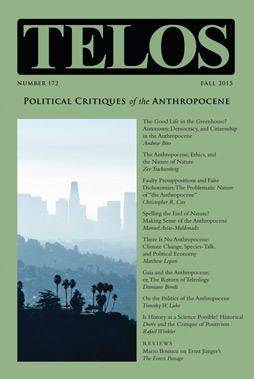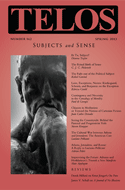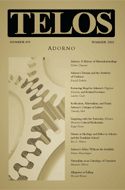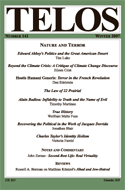By Telos Press · Thursday, September 1, 2016 “The human receives a particular historical consciousness from his ‘space,’ which is subjected to great historical transformations. The variegated forms of life correspond to equally differentiated spaces. Even within the same time period, the environment of individual humans for the practice of daily life is already defined differently by their different life occupations. An urbanite thinks the world otherwise than does a peasant farmer, a whale-fish hunter has another living space than an opera singer, and to a pilot the world and life appear otherwise not only in other lights but also in other quantities, depths, and horizons.”
—Carl Schmitt, Land and Sea: A World-Historical Meditation
Continue reading →
By Christopher R. Cox · Monday, October 12, 2015  Critiques of the Anthropocene abound, but few adequately challenge the argument’s historical weaknesses. This essay is meant to engage them. The Anthropocene argument relies deeply upon the false dichotomy that human reality is not geological reality; that individual and collective human behaviors are of more importance than the systems in which those behaviors are manifested. The violent ontological notion that humans are extra-natural and nature is extra-human, the human/nature divide, set the stage long ago for the systemic exploitation and appropriation of nature. Unlimited accumulation of capital is a holographic-like reality, only plausible if humans are seen as the beneficiaries of nature’s “bounty,” and extra-human nature as the beneficiary of humanity’s waste. My argument unfolds in three pieces: First, these problematic ontologies are laid out and retreated with historical relationality. Second, I utilize some key theses from the work of Jason W. Moore to take seriously the notion that “nature” is not in fact ontologically divided from the human, but is always already co-constitutive of both the human and the extra-human. This framing allows us to see that carbon intensive social engines are only possible under specific organizational regimes of power. Capital, not the Anthropos, is at the heart of what the Anthropocene is most concerned about, carbon, and therefore the Anthropocene is a misnomer. It is in this sense that I argue, in solidarity with Moore and others, that this new epoch we have entered is more aptly called the Capitalocene. Critiques of the Anthropocene abound, but few adequately challenge the argument’s historical weaknesses. This essay is meant to engage them. The Anthropocene argument relies deeply upon the false dichotomy that human reality is not geological reality; that individual and collective human behaviors are of more importance than the systems in which those behaviors are manifested. The violent ontological notion that humans are extra-natural and nature is extra-human, the human/nature divide, set the stage long ago for the systemic exploitation and appropriation of nature. Unlimited accumulation of capital is a holographic-like reality, only plausible if humans are seen as the beneficiaries of nature’s “bounty,” and extra-human nature as the beneficiary of humanity’s waste. My argument unfolds in three pieces: First, these problematic ontologies are laid out and retreated with historical relationality. Second, I utilize some key theses from the work of Jason W. Moore to take seriously the notion that “nature” is not in fact ontologically divided from the human, but is always already co-constitutive of both the human and the extra-human. This framing allows us to see that carbon intensive social engines are only possible under specific organizational regimes of power. Capital, not the Anthropos, is at the heart of what the Anthropocene is most concerned about, carbon, and therefore the Anthropocene is a misnomer. It is in this sense that I argue, in solidarity with Moore and others, that this new epoch we have entered is more aptly called the Capitalocene.
Continue reading →
By Patrícia Vieira · Monday, December 1, 2014 Christopher Nolan’s Interstellar paints the portrait of a brave new time in the future when we will finally cut the shackles attaching us to our dying home planet and embrace our nomadic nature. Having turned the earth into a gigantic dust bowl, where the soil is increasingly barren and the air unbreathable, we will move on to greener pastures, in the shape of as yet unpolluted planets in faraway galaxies. After all, why shouldn’t planets be more like paper tissues—one soiled and tossed, another one already on the way?
Continue reading →
By Steven Knepper · Wednesday, May 22, 2013 Steven Knepper’s “Seeing the Countryside: Behind the Pastoral and Progressivist Veils” appears in Telos 162 (Spring 2013). Read the full version online at the Telos Online website, or purchase a print copy of the issue in our store.
 Building upon the work of Raymond Williams, this essay questions the lack of critical scrutiny given to the countryside and its cash crop monocultures. It holds that simple narratives of decline and progress contribute to this strange invisibility. Simple narratives of decline often contrast an idealized countryside and an insidious city, drawing a pastoral veil over the problems and economics of the actual working countryside. Simple narratives of progress often suggest that we have left the countryside behind entirely. When they do acknowledge continuing agricultural realities, they display what Vandana Shiva calls a “monoculture of the mind.” They present contemporary agribusiness as the only way to feed the world, thereby deflecting critical attention. In order to truly see the countryside and its centrality to modernity, this essay suggests we must draw back the pastoral and progressivist veils. Building upon the work of Raymond Williams, this essay questions the lack of critical scrutiny given to the countryside and its cash crop monocultures. It holds that simple narratives of decline and progress contribute to this strange invisibility. Simple narratives of decline often contrast an idealized countryside and an insidious city, drawing a pastoral veil over the problems and economics of the actual working countryside. Simple narratives of progress often suggest that we have left the countryside behind entirely. When they do acknowledge continuing agricultural realities, they display what Vandana Shiva calls a “monoculture of the mind.” They present contemporary agribusiness as the only way to feed the world, thereby deflecting critical attention. In order to truly see the countryside and its centrality to modernity, this essay suggests we must draw back the pastoral and progressivist veils.
Continue reading →
By Eric S. Nelson · Friday, July 15, 2011 Eric S. Nelson’s “Revisiting the Dialectic of Environment: Nature as Ideology and Ethics in Adorno and the Frankfurt School” appears in Telos 155 (Summer 2011). Read the full version online at the Telos Online website, or purchase a print copy of the issue in our store.
 As a contribution to a responsive and critical materialist ethics of environments and animals, this essay reexamines the significance of nature and animals in the critical social theory of Theodor Adorno. In response to the anthropocentric stance of intersubjective discourse and recognition in recent figures associated with the Frankfurt School, such as Jürgen Habermas and Axel Honneth, I argue for the ecological import of the aporetic dialectic of nature and society in Adorno and Horkheimer’s Dialectic of Enlightenment and Adorno’s later works. Adorno’s continuing confrontation with the “domination of nature” traces the tensions between the ideological construction and resistance of “nature” as well as the instrumentalization and implicit disruptive promise of sensuous life. These tensions indicate the material and bodily bonds between human and animal happiness and suffering and the ambiguous role of mimesis in both domination and emancipation. Adorno insisted on the critical prospect of an unforced and non-coercive freedom that brings us toward the object and responsibility for socially and historically mediated and non-identical natural life. As a contribution to a responsive and critical materialist ethics of environments and animals, this essay reexamines the significance of nature and animals in the critical social theory of Theodor Adorno. In response to the anthropocentric stance of intersubjective discourse and recognition in recent figures associated with the Frankfurt School, such as Jürgen Habermas and Axel Honneth, I argue for the ecological import of the aporetic dialectic of nature and society in Adorno and Horkheimer’s Dialectic of Enlightenment and Adorno’s later works. Adorno’s continuing confrontation with the “domination of nature” traces the tensions between the ideological construction and resistance of “nature” as well as the instrumentalization and implicit disruptive promise of sensuous life. These tensions indicate the material and bodily bonds between human and animal happiness and suffering and the ambiguous role of mimesis in both domination and emancipation. Adorno insisted on the critical prospect of an unforced and non-coercive freedom that brings us toward the object and responsibility for socially and historically mediated and non-identical natural life.
Continue reading →
By Russell A. Berman · Saturday, December 29, 2007 Telos 141: Nature and Terror is available in our store.
 Classical figures of thought endure. A long-standing image of the health of nature contrasts the bucolic landscape with the corruption of the city, where violence abounds. The only security is a natural way of life, far from the brutal metropolis—until nature turns out to be a threat, and we succumb to the uncontrollable fear named for that destructive god: panic. The state of nature is the homeland of violence, its only law the law of the jungle, as we scurry back to the city to find security—until it morphs into the security state. Critical Theory described this dynamic as a sometimes too narrow narrative of domination: the human mastery of nature, in the interest of self-preservation, turns into the mastery of humanity by an encompassing machinery of control. This is an old story, but it comes to us anew in this political season, in which nature and terror—the anxieties about the environment and fear of terrorism, as well as the reaction to it—haunt us, in public and in private. Classical figures of thought endure. A long-standing image of the health of nature contrasts the bucolic landscape with the corruption of the city, where violence abounds. The only security is a natural way of life, far from the brutal metropolis—until nature turns out to be a threat, and we succumb to the uncontrollable fear named for that destructive god: panic. The state of nature is the homeland of violence, its only law the law of the jungle, as we scurry back to the city to find security—until it morphs into the security state. Critical Theory described this dynamic as a sometimes too narrow narrative of domination: the human mastery of nature, in the interest of self-preservation, turns into the mastery of humanity by an encompassing machinery of control. This is an old story, but it comes to us anew in this political season, in which nature and terror—the anxieties about the environment and fear of terrorism, as well as the reaction to it—haunt us, in public and in private.
Continue reading →
|
|

 Building upon the work of Raymond Williams, this essay questions the lack of critical scrutiny given to the countryside and its cash crop monocultures. It holds that simple narratives of decline and progress contribute to this strange invisibility. Simple narratives of decline often contrast an idealized countryside and an insidious city, drawing a pastoral veil over the problems and economics of the actual working countryside. Simple narratives of progress often suggest that we have left the countryside behind entirely. When they do acknowledge continuing agricultural realities, they display what Vandana Shiva calls a “monoculture of the mind.” They present contemporary agribusiness as the only way to feed the world, thereby deflecting critical attention. In order to truly see the countryside and its centrality to modernity, this essay suggests we must draw back the pastoral and progressivist veils.
Building upon the work of Raymond Williams, this essay questions the lack of critical scrutiny given to the countryside and its cash crop monocultures. It holds that simple narratives of decline and progress contribute to this strange invisibility. Simple narratives of decline often contrast an idealized countryside and an insidious city, drawing a pastoral veil over the problems and economics of the actual working countryside. Simple narratives of progress often suggest that we have left the countryside behind entirely. When they do acknowledge continuing agricultural realities, they display what Vandana Shiva calls a “monoculture of the mind.” They present contemporary agribusiness as the only way to feed the world, thereby deflecting critical attention. In order to truly see the countryside and its centrality to modernity, this essay suggests we must draw back the pastoral and progressivist veils.  As a contribution to a responsive and critical materialist ethics of environments and animals, this essay reexamines the significance of nature and animals in the critical social theory of Theodor Adorno. In response to the anthropocentric stance of intersubjective discourse and recognition in recent figures associated with the Frankfurt School, such as Jürgen Habermas and Axel Honneth, I argue for the ecological import of the aporetic dialectic of nature and society in Adorno and Horkheimer’s Dialectic of Enlightenment and Adorno’s later works. Adorno’s continuing confrontation with the “domination of nature” traces the tensions between the ideological construction and resistance of “nature” as well as the instrumentalization and implicit disruptive promise of sensuous life. These tensions indicate the material and bodily bonds between human and animal happiness and suffering and the ambiguous role of mimesis in both domination and emancipation. Adorno insisted on the critical prospect of an unforced and non-coercive freedom that brings us toward the object and responsibility for socially and historically mediated and non-identical natural life.
As a contribution to a responsive and critical materialist ethics of environments and animals, this essay reexamines the significance of nature and animals in the critical social theory of Theodor Adorno. In response to the anthropocentric stance of intersubjective discourse and recognition in recent figures associated with the Frankfurt School, such as Jürgen Habermas and Axel Honneth, I argue for the ecological import of the aporetic dialectic of nature and society in Adorno and Horkheimer’s Dialectic of Enlightenment and Adorno’s later works. Adorno’s continuing confrontation with the “domination of nature” traces the tensions between the ideological construction and resistance of “nature” as well as the instrumentalization and implicit disruptive promise of sensuous life. These tensions indicate the material and bodily bonds between human and animal happiness and suffering and the ambiguous role of mimesis in both domination and emancipation. Adorno insisted on the critical prospect of an unforced and non-coercive freedom that brings us toward the object and responsibility for socially and historically mediated and non-identical natural life.  Classical figures of thought endure. A long-standing image of the health of nature contrasts the bucolic landscape with the corruption of the city, where violence abounds. The only security is a natural way of life, far from the brutal metropolis—until nature turns out to be a threat, and we succumb to the uncontrollable fear named for that destructive god: panic. The state of nature is the homeland of violence, its only law the law of the jungle, as we scurry back to the city to find security—until it morphs into the security state. Critical Theory described this dynamic as a sometimes too narrow narrative of domination: the human mastery of nature, in the interest of self-preservation, turns into the mastery of humanity by an encompassing machinery of control. This is an old story, but it comes to us anew in this political season, in which nature and terror—the anxieties about the environment and fear of terrorism, as well as the reaction to it—haunt us, in public and in private.
Classical figures of thought endure. A long-standing image of the health of nature contrasts the bucolic landscape with the corruption of the city, where violence abounds. The only security is a natural way of life, far from the brutal metropolis—until nature turns out to be a threat, and we succumb to the uncontrollable fear named for that destructive god: panic. The state of nature is the homeland of violence, its only law the law of the jungle, as we scurry back to the city to find security—until it morphs into the security state. Critical Theory described this dynamic as a sometimes too narrow narrative of domination: the human mastery of nature, in the interest of self-preservation, turns into the mastery of humanity by an encompassing machinery of control. This is an old story, but it comes to us anew in this political season, in which nature and terror—the anxieties about the environment and fear of terrorism, as well as the reaction to it—haunt us, in public and in private. 

